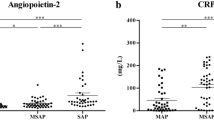Abstract
Backgrounds
Angiopoietin-2 (Ang-2) is a new predictor for acute pancreatitis (AP).
Aims
To assess the predictive value of Ang-2 in determining the progress of AP and the subsequent acute gastrointestinal injury (AGI).
Methods
This was a prospective study that enrolled 170 patients with AP and 100 healthy controls. Blood samples were collected within 24 h of the onset of AP.
Results
The majority (108) of the patients were categorized as having MAP with the rest (62) classified as suffering from SAP. Considering AGI grading, there were 118 grade 1 and 12 grade 4 patients; in grades 2 and 3, there were 20 patients each. AP was accompanied by MODS and pancreatic necrosis in 46 and 24 cases, respectively. Eighty patients were admitted to the ICU, while mortality was reported among 7.1% patients. The plasma Ang-2 levels were higher among patients with AP than in controls. A similar trend prevailed, in patients with SAP compared to those with MAP. Ang-2 was significantly increased from AGI grade 1 through to grade 4, showing a desirable positive predictive accuracy. Moreover, Ang-2 also showed strong correlations with intestinal permeability as evaluated by d-lactate (DLA), diamine oxidase (DAO), and intestinal fatty acid binding proteins (I-FABPs). Tools (Ranson and APACHE II scores, CRP), which are used more conventionally, could not effectively distinguish the various grades of AGI. Furthermore, Ang-2 predicted poor prognosis and adverse outcomes, including mortality, among patients with AP.
Conclusions
This study showed Ang-2 to be an accurate early predictor for SAP, AGI, and intestinal barrier dysfunction, outperforming conventional biomarkers. Ang-2 levels also predicted the adverse outcomes and mortality due to AP.







Similar content being viewed by others
References
Marshall JC. The multiple organ dysfunction (MOD) score. Sepsis. 1997;1:49–52.
Blaser AR, Malbrain MLNG, Starkopf J, et al. Gastrointestinal function in intensive care patients: terminology, definitions and management. Recommendations of the ESICM Working Group on Abdominal Problems. Intensive Care Med. 2012;38:384–394.
Roberts SE, Akbari A, Thorne K, et al. The incidence of acute pancreatitis: impact of social deprivation, alcohol consumption, seasonal and demographic factors. Alimentary Pharmacol Ther. 2013;38:539–548.
Afghani E, Pandol SJ, Shimosegawa T, et al. Acute pancreatitis—progress and challenges: a report on an international symposium. Pancreas. 2015;44:1195–1210.
Whitcomb DC, Muddana V, Langmead CJHF Jr, et al. Angiopoietin-2, a regulator of vascular permeability in inflammation, is associated with persistent organ failure in patients with acute pancreatitis from the United States and Germany. Gastroenterology. 2010;138:238–239.
Zhang YP, Liu C, Ye L, et al. Early prediction of persistent organ failure by serum angiopoietin-2 in patients with acute pancreatitis. Dig Dis Sci. 2016;61:3584–3591.
Mateusz S, Paulina D, Agnieszka GB, et al. Angiopoietin-2 is an early indicator of acute pancreatic-renal syndrome in patients with acute pancreatitis. Med Inflammation. 2016;2016:1–7.
Dumnicka P, Kuśnierz-Cabala B, Sporek M, et al. Serum concentrations of angiopoietin-2 and soluble fms-like tyrosine kinase 1 (sFlt-1) are associated with coagulopathy among patients with acute pancreatitis. Int J Mol Sci. 2017;18:753.
Besselink MG, Van Santvoort HC, Renooij W, et al. Intestinal barrier dysfunction in a randomized trial of a specific probiotic composition in acute pancreatitis. Ann Surg. 2009;250:712–719.
Fritz S, Hackert T, Hartwig W, et al. Bacterial translocation and infected pancreatic necrosis in acute necrotizing pancreatitis derives from small bowel rather than from colon. Am J Surg. 2010;200:111–117.
Andersson A, Fenhammar J, Frithiof R, et al. Mixed endothelin receptor antagonism with tezosentan improves intestinal microcirculation in endotoxemic shoc. J Surg Res. 2008;149:138–147.
Milnerowicz S, Milnerowicz H, Nabzdyk S, et al. Plasma endothelin-1 levels in pancreatic inflammations. Adv Clin Exp Med. 2013;22:361–368.
Staubli SM, Oertli D, Nebiker CA. Laboratory markers predicting severity of acute pancreatitis. Crit Rev Clin Lab Sci. 2015;52:273–283.
Dabrowski A, Osada J, Dabrowska MI, et al. Increased expression of the intercellular adhesion molecule-1 (ICAM-1) on peripheral blood neutrophils in acute pancreatitis. Adv Med Sci. 2014;59:102–107.
Zhang KJ, Zhang DL, Jiao XL, et al. Effect of phospholipase A2 silencing on acute experimental pancreatitis. Eur Rev Med Pharmacol Sci. 2013;17:3279–3284.
Linares PM, Chaparro M, Gisbert JP. Angiopoietins in inflammation and their implication in the development of inflammatory bowel disease: a review. J Crohn’s Colitis. 2014;8:183–190.
Yan Zhi-Xin, Jiang Zhao-Hua, Liu Ning-Fei. Angiopoietin-2 promotes inflammatory lymphangiogenesis and its effect can be blocked by the specific inhibitor L1-10. Ajp Heart Circ Physiol. 2011;302:H215–H223.
Koutroubakis IE, Xidakis C, Karmiris K, et al. Potential role of soluble angiopoietin-2 and Tie-2 in patients with inflammatory bowel disease. Eur J Clin Investig. 2006;36:127–132.
Rahman SH, Ammori BJ, Holmfield J, et al. Intestinal hypoperfusion contributes to gut barrier failure in severe acute pancreatitis. J Gastrointest Surg. 2003;7:26–36.
Buddingh KT, Koudstaal LG, Van Santvoort HC, et al. Early angiopoietin-2 levels after onset predict the advent of severe pancreatitis, multiple organ failure, and in patients with acute pancreatitis. J Am College Surg. 2014;218:26–32.
Acknowledgments
We thank Jiangyuan Wang for the assistance in data analysis and Zhaopeng Zhang, Jiayang Liu, and the nursing team of gastroenterology and emergency department of Peking University People’s Hospital for the blood sample collection. This project (RD 2016-29) was supported by Peking University People’s Hospital Research and Development Funds.
Author information
Authors and Affiliations
Corresponding author
Ethics declarations
Conflict of interest
The authors declare that they have no conflict of interest.
Ethics approval
The study was approved by the Ethics Committee of Peking University People’s Hospital. All the patients enrolled in the study were well informed and signed the informed consents.
Additional information
Publisher's Note
Springer Nature remains neutral with regard to jurisdictional claims in published maps and institutional affiliations.
Rights and permissions
About this article
Cite this article
Huang, Q., Wu, Z., Chi, C. et al. Angiopoietin-2 Is an Early Predictor for Acute Gastrointestinal Injury and Intestinal Barrier Dysfunction in Patients with Acute Pancreatitis. Dig Dis Sci 66, 114–120 (2021). https://doi.org/10.1007/s10620-020-06138-0
Received:
Accepted:
Published:
Issue Date:
DOI: https://doi.org/10.1007/s10620-020-06138-0




